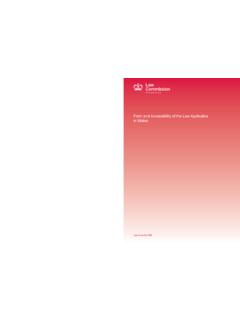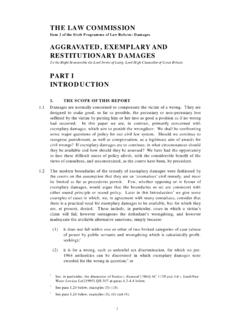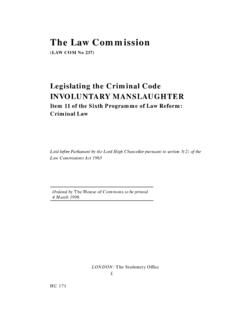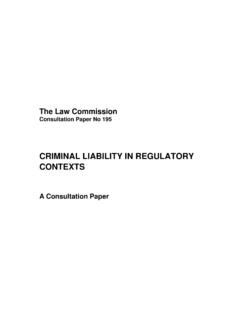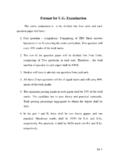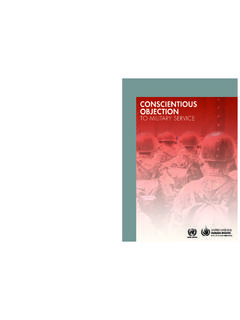Transcription of THE ILLEGALITY DEFENCE - Law Commission
1 The Law CommissionConsultation Paper No 189 THE ILLEGALITY DEFENCEA Consultative ReportiiiiiTHE LAW Commission HOW WE CONSULTA bout the Law Commission : The Law Commission was set up by section 1 of the LawCommissions Act 1965 for the purpose of promoting the reform of the Law Commissioners are: The Rt Hon Lord Justice Etherton (Chairman), Professor ElizabethCooke, Mr David Hertzell, Professor Jeremy Horder and Kenneth Parker Chief Executive is William : We ask whether a claimant who has been involved in illegal conduct should be entitled toenforce a claim in contract, unjust enrichment, trusts and tort. We welcome views on our provisionalrecommendations. A summary is attached and an impact assessment is included in Part scope: England and consultation: This follows consultation papers on ILLEGALITY in Contracts and Trusts(1999) and the ILLEGALITY DEFENCE in Tort (2001).
2 Duration of the consultation: from 23 January 2009 to 20 April the consultation: In the light of the responses, we will decide our final recommendations andpresent them to Parliament. We hope to publish our final report in autumn of information: We will treat all responses as public documents in accordance with theFreedom of Information Act. We may attribute comments and include a list of all respondents'names in any final report we publish. If you wish to submit a confidential response, you shouldcontact us before sending the NOTE We will disregard automatic confidentiality statements generated by an of Practice: We are a signatory to the Government s Code of Practice on Consultation andfollow the criteria set out on the next : You can view/download the paper free of charge from our website at: to respondPlease send your responses either By email post to:Helen Hall, Law Commission , Steel House, 11 Tothill Street, London SW1H 9 LJTel: 020-3334-0288 / Fax: 020-3334-0201If you send your comments by post, it would be helpful if, where possible, you also sent them to uselectronically (in any commonly used format).
3 IvCODE OF PRACTICE ON CONSULTATION THE SEVEN CONSULTATION CRITERIAC riterion 1:When to consultFormal consultation should take place at a stage when there is scope to influence the 2:Duration of consultation exerciseConsultations should normally last for at least 12 weeks with consideration given to longertimescales where feasible and 3:Clarity and scope of impactConsultation documents should be clear about the consultation process, what is beingproposed, the scope to influence and the expected costs and benefits of the 4:Accessibility of consultation exercisesConsultation exercises should be designed to be accessible to, and clearly targeted at,those people the exercise is intended to 5:The burden of consultationKeeping the burden of consultation to a minimum is essential if consultations are to beeffective and if consultees buy-in to the process is to be 6:Responsiveness of consultation exercisesConsultation responses should be analysed carefully and clear feedback should be providedto participants following the 7:Capacity to consultOfficials running consultations should seek guidance in how to run an effective consultationexercise and share what they have learned from the experience.
4 CONSULTATION CO-ORDINATORThe Law Commission s Consultation Co-ordinator is Correna Callender. You are invited to send comments to the Consultation Co-ordinator about the extent towhich the criteria have been observed and any ways of improving the consultationprocess. Contact:Correna Callender, Law Commission , Steel House, 11 Tothill Street, LondonSW1H 9LJ Email: details of the Government s Code of Practice on Consultation are available on theBERR website at LAW COMMISSIONTHE ILLEGALITY DEFENCECONTENTSP aragraph PageSummary viiiPART I: INTRODUCTION 1A brief history of the project scope of this Consultative of our provisional impact of this Consultative 2: WHY DO WE NEED ANY DOCTRINE OF ILLEGALITY ? 7 Introduction policy rationales statutory regimes for confiscation and civil on the policy rationales 3: ILLEGALITY AND CONTRACTUAL present with the present in other interaction between the rules on ILLEGALITY and under European Union law The interaction between the rules on ILLEGALITY and under the European Convention on Human Rights viParagraph PageReform: statutory : ILLEGALITY under the common 4: ILLEGALITY AND THE REVERSAL OF UNJUST as a DEFENCE to a claim for the reversal unjust enrichmentIllegality as a ground to a claim for restitution for enrichment: the time for repentance ILLEGALITY and the DEFENCE of change of 5.
5 ILLEGALITY AND THE RECOGNITION OF 86 CONTRACTUALLY TRANSFERRED, CREATED ORRETAINED LEGAL PROPERTY present law with the present proposals on consultation and reaction to way forward 6: ILLEGALITY AND trusts: the present law trusts: the present trusts: the present that follow from a trust being unenforceable illegalityProblems with the present proposals on consultation and reaction to for PagePART 7: ILLEGALITY IN present with the present 8: LIST OF PROVISIONAL RECOMMENDATIONS147 Part 2 why do we need any doctrine of ILLEGALITY ? 3 ILLEGALITY and contractual 4 ILLEGALITY and the reversal of unjust 5 ILLEGALITY and the recognition of contractually , created or retained legal property rightsPart 6 ILLEGALITY and 7 ILLEGALITY in A: THE PROCEEDS OF CRIME ACT 2002149 APPENDIX B: LIST OF RESPONDENTS155viiiTHE ILLEGALITY DEFENCESUMMARYTHE PROBLEM Where claimants are involved in some form of illegal conduct, how far should thisprevent them from enforcing their normal legal rights?
6 This issue arises in manyareas of law. In this Consultative Report, we look at the effect of claimants illegalconduct on claims: for contractual enforcement for example where an employee, seeking toenforce an employment contract, is paid cash-in-hand; for the reversal of unjust enrichment for example where a buyer seeksthe return of the money already paid for goods which it turns out may notbe sold legally; for the recognition of legal title to property for example where theclaimant asserts that property has been transferred to him or her under acontract which breaches statutory hire purchase regulations; to enforce equitable interests for example where the claimant assertsthat he or she is the beneficial owner of property held under a trustarrangement originally created to evade tax; in tort for example where the claimant claims compensation for apersonal injury sustained while committing a criminal offence.
7 In answering this question, it is particularly difficult to set out hard and fast is because the ILLEGALITY DEFENCE may be raised in such a wide variety ofcontexts. For example: In some cases, the illegal conduct may be relatively trivial. In others, theclaimant s conduct may be seriously reprehensible. The connection of the ILLEGALITY to the claim varies. It may be inextricablylinked, for example where the claimant seeks to enforce an interest in atrust set up to hide the true ownership of assets for fraudulent the ILLEGALITY may be merely incidental to the claim, as where a roadhaulier seeks to enforce payment when the delivery driver has exceededthe speed limit. The comparative guilt of the parties varies. Sometimes the illegalitydefence may benefit an innocent defendant who is unaware of theclaimant s illegal conduct.
8 Sometimes it provides an unmerited windfall toa defendant who is equally or more implicated in the illegal conduct thanthe claimant. In some cases, the effect of denying the claimant s claimmay be to benefit a guilty defendant at the expense of the claimant sinnocent creditors. Sometimes the consequences of denying the claim may appear just while in others they may seem disproportionate (as where a minor crimedeprives the claimant of an interest in his or her home).ix The courts have attempted to lay down a series of rules to apply in these manydifferent circumstances. The result is a body of law which is technical, uncertainand sometimes arbitrary. It often lacks transparency. Occasionally it producesresults which may appear unduly CONSULTATION In our two consultation papers on this issue,1 we provisionally proposedlegislative reform.
9 We thought that the courts should be given a statutorydiscretion to decide whether the claimant s involvement in some form of illegalityshould act as a DEFENCE to a claim. In exercising this discretion the courts shouldtake into account a list of factors such as the seriousness of the ILLEGALITY involvedand the proportionality of denying relief. The responses we received to our consultations and the further work we carriedout have led us to conclude that we should not recommend legislation for mostareas of law. This is partly because it would be difficult to define the ambit of astatutory discretion in a way that did not cause further problems. We also thinkthat in most cases legislation is unnecessary. The courts could reach the desiredresult through development of the case CURRENT VIEWJ udicial development: ILLEGALITY and contract, unjust enrichment and tort We consider that in contract, unjust enrichment and tort claims it is open to thecourts to develop the law in ways that would render it considerably clearer, morecertain and less arbitrary.
10 In this Consultative Report, we include a detailed discussion of the case law inthese areas. We show how in most cases, the courts weigh policy arguments toprovide a fair result. However, their task is made more difficult by the perceivedneed to abide by detailed and ostensibly rigid rules. We argue that judges should base their decisions directly on the policies thatunderlie the ILLEGALITY DEFENCE and explain their reasoning accordingly. The socalled rules are in fact no more than guidance that show how these policiesoperate. What matters is how the relevant factors apply in each particular courts should allow the ILLEGALITY DEFENCE to succeed only where it can bejustified by a particular public policy policy rationales We set out the policy rationales in Part 2. The normal business of the courts is todecide cases according to the law.

